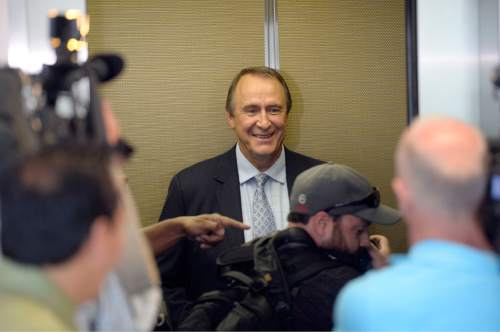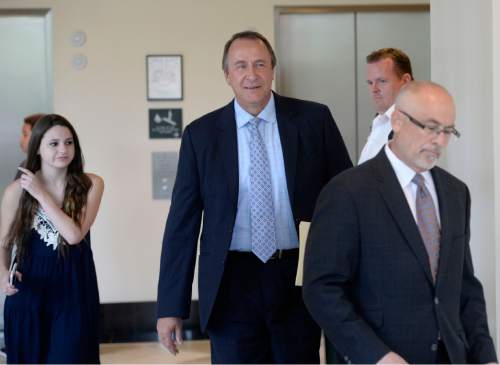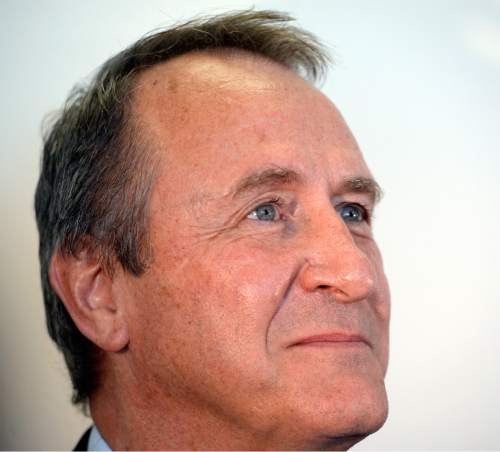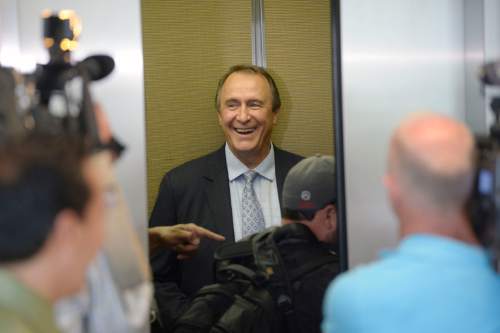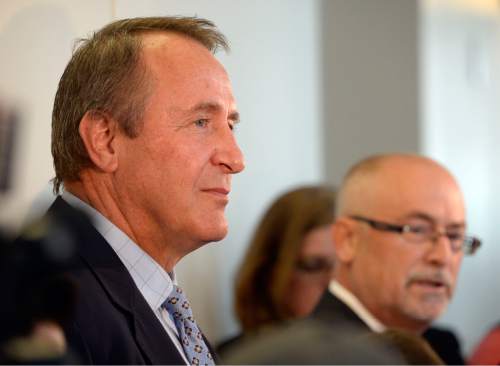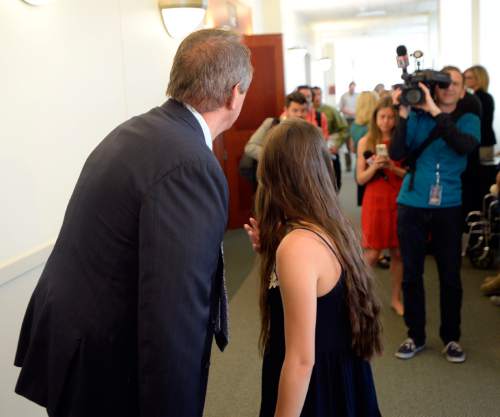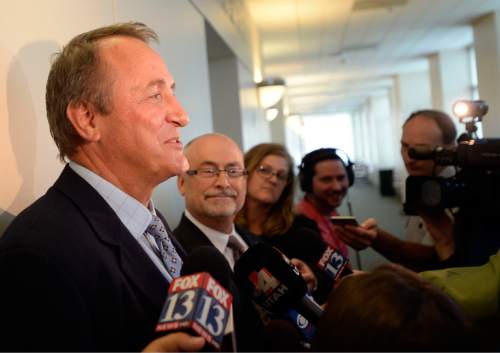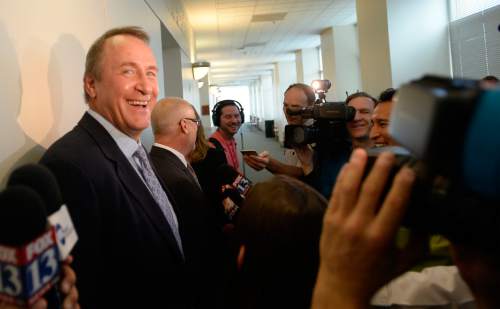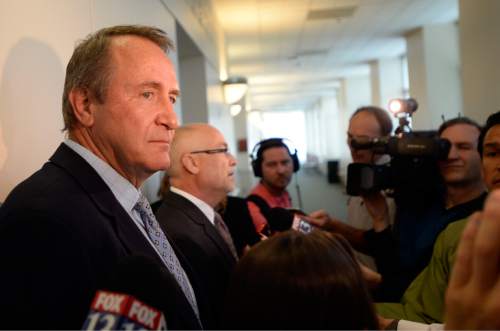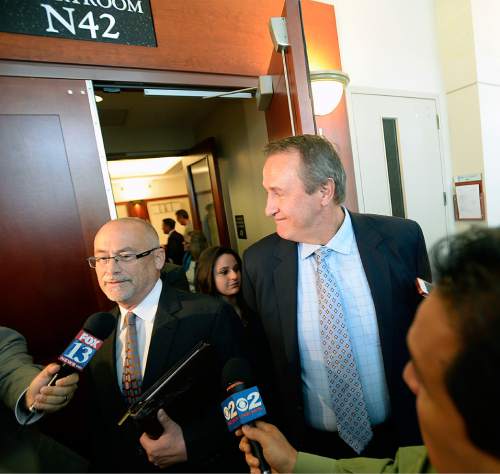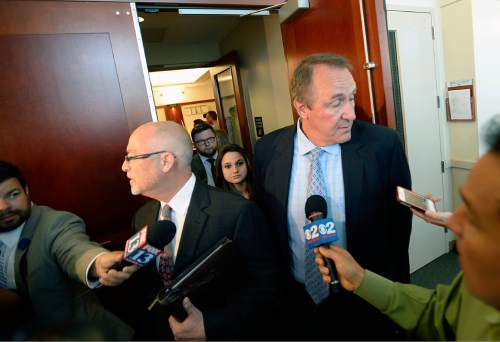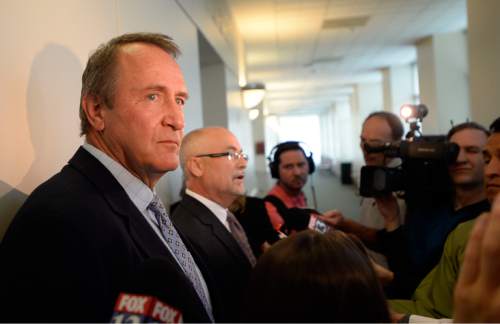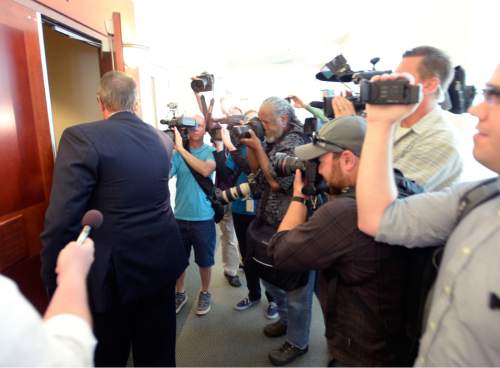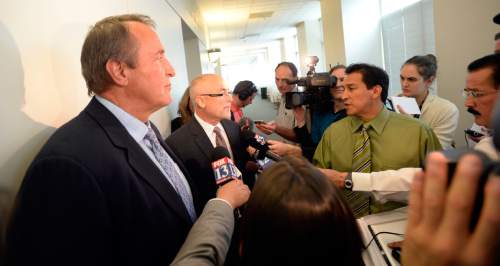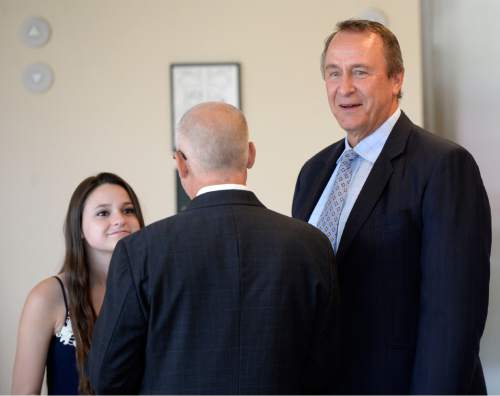This is an archived article that was published on sltrib.com in 2015, and information in the article may be outdated. It is provided only for personal research purposes and may not be reprinted.
Prosecutors amended the criminal charges filed against former Utah Attorney General Mark Shurtleff on Monday, dropping three bribery counts that his lawyer insists were the foundation of allegations that the state's former top cop had operated a pay-to-play scheme while in office.
"We are pleased that the pay-to-play, the quid pro quo, is not in there," defense attorney Richard Van Wagoner said. "It never should have been."
The new charges — counts of accepting prohibited gifts, obstruction of justice, official misconduct and bribery to dismiss a criminal proceeding — amount to five felonies and two misdemeanors, down from the nine felonies Shurtleff had faced for months.
Despite the fewer number of charges, Shurtleff still faces a maximum penalty of up to 30 years in prison if he is convicted.
Davis County Attorney Troy Rawlings, who declined to comment, filed the amended counts minutes before a Monday afternoon preliminary hearing was scheduled to begin in Salt Lake City's 3rd District Court.
After Monday's court appearance, Van Wagoner said the tweaked charges are the result of months of negotiations.
"We've been meeting with [prosecutors] for months," he said, "and fighting over what the evidence is, what it means and what it doesn't mean."
Van Wagoner credited Rawlings with taking the time to evaluate the evidence, but stopped short of saying Salt Lake County District Attorney Sim Gill — who, with the Davis County attorney, brought the initial charges against Shurtleff — did not.
"Compare the criminal charges," Van Wagoner said, "and draw your own conclusions."
As with the original filing from July 2014, the new charges lack a detailed probable-cause statement. The three-page document, however, does include abbreviated references to the actions Shurtleff allegedly took that landed him in legal trouble.
That includes taking gifts, including stays at a luxury resort, and the use of a private jet, bankrolled by convicted businessman Marc Sessions Jenson and indicted executive Jeremy Johnson, who donated tens of thousands to Shurtleff's campaign.
Many of the allegations in the "gift" charges appear to consolidate what prosecutors originally alleged in the bribery counts.
Dropped from the amended information are allegations of witness tampering and accepting a job — with a law firm that represented Bank of America, which was embroiled in a lawsuit with Utah — that would have impaired judgment. One obstruction of justice charge was reduced to a misdemeanor.
There is a new bribery count, but it doesn't appear to be tied to directly to any quid pro quo in return for a campaign donation.
Shurtleff entered a "conditional waiver" Monday, meaning he will skip the evidence hearing for now, but preserves the right to have one at a later date. A conditional waiver also allows attorneys to raise and resolve issues with the court ahead of a preliminary hearing.
An arraignment hearing was set for June 29 before Judge Elizabeth Hruby-Mills.
Shurtleff, 57, who served as Utah's attorney general for a dozen years, has maintained his innocence throughout, and did so again through his lawyer Monday.
"He is not just not guilty," Van Wagoner said. "He is innocent of any wrongdoing."
Van Wagoner called Shurtleff's case a cautionary tale for all elected officials, saying that politicians who take campaign contributions and don't believe they are influenced by that money are lying to themselves.
He also criticized permissive campaign-finance laws — and the squishy line between a gift and bribery — for contributing to a corrupt political system.
"If you think that the allegations against Mr. Shurtleff were unusual or extraordinary, think again," Van Wagoner said. "The allegations are business as usual."
Van Wagoner urged Utah to establish an independent inspector general to investigate allegations of corruption and bring charges separate from district attorneys or the attorney general's office.
For his part, Shurtleff was mostly silent after the hearing, joking that his "SOB" attorney had forbidden him from speaking, while adding that he "feels good" and has "great representation."
Observers say it is not uncommon for prosecutors to amend criminal charges.
"As with any lawsuit, during the course of the lawsuit, you're going to interact with witnesses, you're going to take different looks and perspectives at the evidence and sometimes you're going to realize the charges aren't super-strong," said Craig Pankratz, a former deputy district attorney for Salt Lake County, "and that could be one reason you're dropping some charges or amending them down."
Pankratz said he has amended cases when plea negotiations are getting underway, or when he's realized that streamlining the allegations may help focus a jury's attention and give him a better chance at a conviction.
Pankratz doesn't know if that's the case here, but said "the fact that Mr. Shurtleff has waived the preliminary hearing and, given the prominence of the case, the importance to society, it's likely that the prosecutor is really trying to cross the t's and dot the i's and make sure everything is solid, to make sure there is no appearance of impropriety when Mr. Shurtleff pleads guilty to something."
It was unclear Monday whether the changes would affect the ongoing prosecution of Shurtleff's successor, John Swallow, 52, who faces multiple criminal counts.
Shurtleff and Swallow, both Republicans, were charged as co-defendants in July 2014 with a combined 23 criminal counts related to a corruption scandal, which alleged the pair took bribes to protect or aid big campaign donors whose business practices landed them in legal trouble.
The charges, brought jointly by Rawlings, a Republican, and Gill, a Democrat, followed months of investigative work by county, state and federal authorities, state lawmakers and the lieutenant governor's office. The cases were later separated. Shurtleff is being prosecuted by Rawlings; Swallow's case is with Gill's office.
Swallow is charged with 13 felonies and one misdemeanor, including racketeering, accepting gifts, bribery, misuse of public funds, falsifying government records, evidence tampering, money laundering, obstruction of justice, lying to investigators and failure to disclose a conflict of interest.
Swallow, who resigned after less than a year in office amid the unfolding scandal, has also maintained his innocence. He had been scheduled for a five-day preliminary hearing June 8, but waived it.
He is expected to plead not guilty at a July 27 arraignment in 3rd District Court.
Reporter Robert Gehrke contributed to this story.


